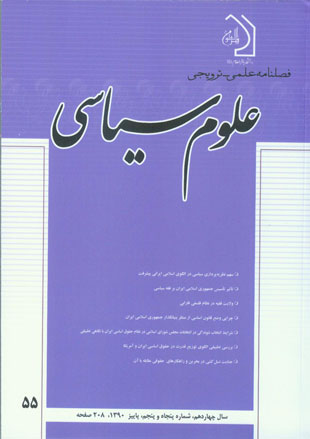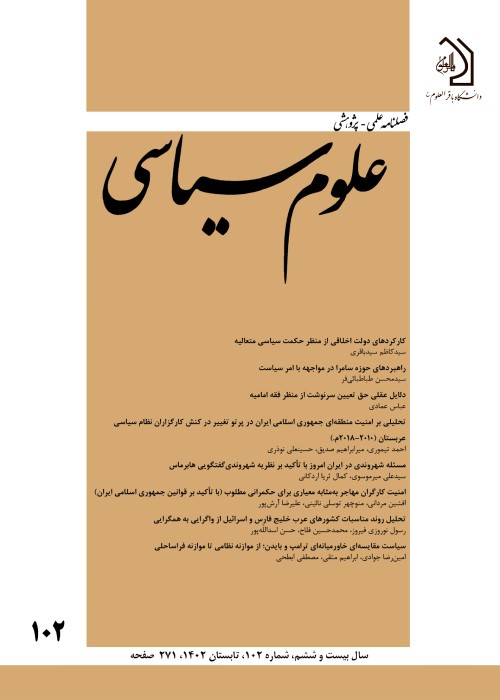فهرست مطالب

نشریه علوم سیاسی
سال چهاردهم شماره 3 (پیاپی 55، پاییز 1390)
- 200 صفحه، بهای روی جلد: 21,000ريال
- تاریخ انتشار: 1390/08/18
- تعداد عناوین: 8
-
- مقالات
-
صفحه 57
-
چکیده مقالات به زبان عربیصفحه 185
-
Page 7Theorization on development and the presentation of economic developmental models traces back to the second half of 20th century in the end of World War II. Although the issue of development began along with the economic development but nowadays it is of broader dimensions. The idea of Iranian Islamic pattern of development has been stated on the basis of this strategy that all of the existent models of development are affected by the anti Islamic bases as well as the secular and western value system. The present article follows two main goals: in one hand, it tries to clarify the meaning and function of Islamic Iranian pattern of development and to introduce the arenas and the dimensions of this pattern and then via focusing on the area of politics, it tries to manifest the role of studies and political theorization in the compilation and the statement of Islamic Iranian pattern of development. The article will illustrate that the compilation of this pattern as a "macro plan of social development" and the infrastructure of creation and renovation of Islamic civilization through regional knowledge and scientific theorization would be possible on the basis of Islamic values and principles in the diverse areas of humanistic and social sciences, and the Islamic political science along with all its sub-branches would be in charge of part of this main duty.Keywords: Development, Islamic Iranian Pattern of Development, Levels of Pattern, Arenas of Pattern of Development, Political Justice, Principle of Political Justice, Political Behavior, Political Relationships
-
Page 23The victory of Iran Islamic Revolution and the experience of religious government provided the ground for the practical presence of political jurisprudence in various political and social areas. It caused jurisprudence to confront with numerous novel questions in variously internal and external areas as well as micro and macro ones and to utilize all its potential to answer those questions through the approach of comprehensive management of system. This article is an endeavor to investigate the way of the effect of this great occurrence on political jurisprudence of Shiah. Moreover, via looking at the effects of experience of system on the political jurisprudence and its alteration in sources, it would be emphasized the way of jurisprudence survey and the way of the presence of jurists in finding new grounds as well as the effect on the quantitative and qualitative extent of jurisprudence survey.Keywords: Political jurisprudence, Political jurisprudence sources, Mode of deduction in political jurisprudence, Islamic Republic, Alternation, Effect
-
Page 57It has been clarified and emphasized the leadership of jurists and religious authorities by Farabi in the assertion of utopia theory. His method in the description and justification of jurisdiction is called representation. Representation famous for imagination, occasion, comparison, analogy and correspondence in Farabi's work is of fundamental position in the understanding the intellects and making them understood. Farabi believes that knowledge of the essence of intellects except the superior intellects common in all humans is considered as an impossible and complex issue and the illustrations of intellects should be drawn by the examples and their representations in the imagination power of Jomhoor. He represents the principle of jurisdiction as part of virtuous leadership with three allegories of the orders of existence, powers of soul, and all healthy physique. He does not consider the problem on proof's side and does not mention any deduction, but he generally adverts to the description and presentation of true imagination out of jurisdiction.Keywords: Farabi, Jurisdiction, the Leadership of Utopia, Sunnite Leadership, Representation, Imagination
-
Page 75Iran's constitution indicative of quantitative and qualitative properties of all institutions and the comprehensive occasions of Iran's society has been considered as the main outcome of long battles of Iran nation via the leadership of jurisdiction of time, departed Imam, against all the anti- Islamic manifestations and it presents the practical framework of the plan of Islamic government on the basis of jurisdiction mentioned by Imam Khomeini during the years prior to revolution.Moreover, this constitution is considered as a great model for the deprived people who hope to see the establishment of a system and a government on the basis of the anti (social) class positions and individual or collective domination and it is a crystallization of ideals of the nations under domination during the history.This article is to discuss the dimensions of the reason for Imam's endeavor to establish the constitution as well as the consequences followed along with this decision. The value of this analysis is to inform the groups and political trends present in the society towards the mentioned goals, so that they can find out the importance of the principle of preservation of constitution and commitment to it as a national charter and a guide to the political behaviors and theories.4In this regard, every action or thought which spoil the authority of this lawful institution would be condemned according to Imam's logic.Therefore, the author has analyzed in two levels the existence philosophy of constitution in Imam's conduct under the title of the reason for the compilation of constitution on the basis of the theory of intellectual election as well as the reason for its compilation based of political-religious necessities.Keywords: Imam Khomeini, Constitution, Political objection, Intellectual election, Political contradiction, Justice, Islamic Republic
-
Page 99Faculty member of academy of culture and Islamic thoughtIn the political systems of world today, the election is considered as the best and the most common way of people's contribution in the political fate of the country and the parliament election is of highly importance compared with the other elections.The election and parliament entered the political literature of our country along with constitutionalism and passed a lot of ups and downs so that following the constitution, the historical eras of Iran has been the witness of parliaments and representatives different from one another.In the Islamic Republic of Iran, the election of Islamic parliament is of utmost significance due to the position of parliament in the system of Islamic Republic of Iran; So that the independent, powerful and public parliament would be one of the first demands of revolutionists, and the constitution has considered a special position for the parliament and the parliament members.In this regard, the importance of parliament election would be in electing the representatives who are mainly responsible for legislative and supervisory activities and they are a manifestation of the exertion of the people's choice for their future.The condition of being elected in the parliament which is the discussing issue of this article is considered as the most important principle which would be different in various systems and countries on the basis of cultural, political and social circumstances.Keywords: Parliament, Election, Condition of being elected, Citizenship, Commitment to constitution, Educational condition, Islam
-
Page 131In this article, the author is to comparatively investigate one of the common issues of law system for the two countries of Iran and America i.e., the commonalities and contradictions regard with the method of setting of institutions, powers and their quantity. In this regard, it will be briefly investigated the structure of power or the power distribution pattern in the two countries of Iran and America. The political system of America is of federal type; accordingly the distribution of power would be discussed once among the central government and states, and the other time among the three powers in the level of federal. In the Islamic Republic of Iran, which is of a concentrated, non- federal and political system, the pattern of power distribution would be investigated in the mould of four axes, i.e., leadership institution, legislative power, executive power, and judicial power. The commonalities and contradictions of the two accepted patterns would be exhibited via the structure of power in two countries.Keywords: Iran, America, Powers, Institutions, Law system, Power distribution
-
Page 159This article is to clarify the criteria of massacre crime and its ambiguous points and to state a brief history of it along with the trend of its development. Through these explanations, it has been investigated the issue of Bahrain, the changes occurred in this country, and the elements of crime of massacre along with proving the occurrence of this crime in Bahrain.Moreover, the present article has endeavored to compare the occurred samples in Bahrain with the international laws and particularly criteria of the crime of massacre. After proving the crime of massacre in this country, the duties and activities of universal society and Muslim nations have been mentioned as well as a brief hint to the function of Saudi Arabian government on these events. Also, it has been pointed out the role of international criminal court -a specific reference on the crime of massacre- to pursue these crimes in Bahrain.Keywords: Massacre, Bahrain, Torture, International Criminal Court, Illegal actions


